theearthorganization.org
When we were studying the art of clinical diagnosis in medical school, we were cautioned not to look for "zebras"--those rare, exotic diseases and conditions we studied but were unlikely ever to encounter in clinical practice. In other words, when a child presents with fever and rash, Fifth Disease or chicken pox should come to mind before you think about less common causes, like Rocky Mountain Spotted Fever or rubella. When a patient comes in with abdominal pain, rule out appendicitis and cholecystitis before you start to worry about Familial Mediterranean Fever. If the problem is dehydration and diarrhea, consider viral gastroenteritis or food poisoning before you think about cholera.
"If it looks like a duck,
and walks like a duck,
and sounds like a duck...
chances are it probably is a duck."
~unknown~
Not always, though.
True stories:
- The patient was a woman in her sixties. She was admitted from the ER directly to the OR with a diagnosis of "acute appendicitis." She'd had increasing pain and tenderness in the right side of her abdomen for two days. The intern on call (me) was summoned to the OR to perform a quick pre-op physical while the OR team waited impatiently. On examination, instead of deep RLQ tenderness, my fingers came up against a tender, pulsating mass in the patient's RLQ, consistent with a leaking aortic aneurysm. Zebra #1.
- A twenty-two year-old man presented with a several week history of fever and malaise. Two weeks earlier, he'd seen a doctor who diagnosed him with a non-specific viral illness. Upon careful examination, he now had a soft (barely audible) diastolic heart murmur and mild enlargement of his spleen, classic findings for subacute bacterial endocarditis. Zebra #2.
- A sixteen year-old presented to his PCP with a two week history of a cold and sore throat. Everyone in his family had had the same symptoms and had recovered uneventfully. The patient's sore throat, however, persisted and was getting worse. Long story short, what sounded like a straightforward case of pharyngitis or Strep throat in a healthy adolescent, turned out to be gonococcal pharyngitis in a closeted gay teenager. The sexual history is not something most of us routinely obtain when we're seeing a patient for upper respiratory symptoms. Zebra #3.
"Medicine is a science of uncertainty
and an art of probability."
~Sir William Osler~
Today, more than ever before, physicians and other health care providers are under intense pressure to see more patients faster. It's tempting to jump to conclusions. To rush through the patient's history and to gloss over portions of the physical exam in order to save time. Sooner or later, though, you're likely to miss an important detail in the patient's story, or to overlook a subtle finding on examination that points to the diagnosis.
What you think is just another pony over there in the field, may turn out to be a zebra, after all.
"The intuitive mind is a sacred gift,
and the rational mind is a faithful servant."
~Albert Einstein~
jan









